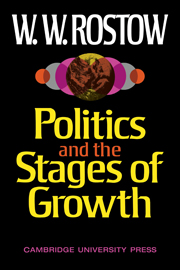Book contents
- Frontmatter
- Contents
- Tables
- PREFACE
- INTRODUCTION
- 1 A way of looking at politics
- 2 Politics in pre-Newtonian societies
- 3 The politics of the preconditions for take-off
- 4 The politics of the take-off and the drive to technological maturity
- 5 American politics: a not so special case
- 6 The politics of the search for quality
- 7 Politics and democracy in the contemporary developing world
- 8 War and peace in the global community
- APPENDIX: The views of others in relation to the approach taken here
- NOTES
- INDEX
8 - War and peace in the global community
Published online by Cambridge University Press: 16 October 2009
- Frontmatter
- Contents
- Tables
- PREFACE
- INTRODUCTION
- 1 A way of looking at politics
- 2 Politics in pre-Newtonian societies
- 3 The politics of the preconditions for take-off
- 4 The politics of the take-off and the drive to technological maturity
- 5 American politics: a not so special case
- 6 The politics of the search for quality
- 7 Politics and democracy in the contemporary developing world
- 8 War and peace in the global community
- APPENDIX: The views of others in relation to the approach taken here
- NOTES
- INDEX
Summary
INTRODUCTION
This final chapter examines the prospects for the community of human beings, taken as a whole, in terms of the three tools whose use has shaped this book:
— The concept of government and politics as the effort to resolve the three abiding but often conflicting imperatives of security, welfare and growth, and the maintenance of an acceptable constitutional balance between justice and order.
— The concept of the stages of growth as the process which, in modern times, has thrown up for political decision many of the critical issues, under each of these three headings, with which government and the political process has had to deal.
— And, behind it all, the concept of man himself, containing in the state within him impulses of spirit, appetite, and reason – id, ego, and superego – which are the ultimate raw materials of organized social life.
What emerges as man's prospects if these three tools are successively applied to the world community?
In the exposition that follows, it is assumed that stable peace does not imply or require world government in the simplistic sense. But it does imply a system of arrangements which would more or less effectively constrain international friction to the terrain of diplomacy and international politics. It also implies effective communal action on behalf of the general welfare of humanity. And, finally, it implies accepted concepts for dealing with problems of justice and order – and the balance between them – in the world community.
- Type
- Chapter
- Information
- Politics and the Stages of Growth , pp. 302 - 333Publisher: Cambridge University PressPrint publication year: 1971



